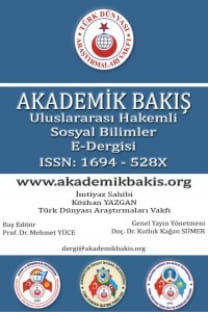GÜÇLÜ EKONOMİYE GEÇİŞ PROGRAMI SONRASI CARİ AÇIKLAR VE HİZMET SEKTÖRÜNÜN KULLANILABİLİRLİĞİ
Her ülkenin, üretiminde karşılaştırmalı üstünlüğe sahip olduğu bir ya da birden fazla ürün/sektör mutlaka vardır. Bu ürün ya da sektörler ülkenin gelişmişlik düzeyinden etkilenmekle beraber; bazen tarım, bazen sanayi, bazen de hizmet alanlarında kendisini gösterir. Türkiye de 1980 yılı itibariyle liberal dış ticaret anlayışını benimseyerek karşılaştırmalı üstünlüğe sahip olduğu üretim alanını belirleme çabasına girmiş ve hizmet ağırlıklı üretim yapısı bu süreçte kendisini göstermeye başlamıştır. Bu çalışma; 2002 yılı itibariyle IMF tabanlı Güçlü Ekonomiye Geçiş Programı (GEGP) kapsamında uygulamaya geçirilen serbestlik yanlısı programların; Türkiyenin Ödemeler Bilançosu ve Cari Açıkları üzerindeki etkisini ve bu açıkları giderebilmek için hizmetler sektörünün kullanılabilirliğini tartışmaktadır. Elde edilen bulgular Türkiyenin ödemeler bilançosu ve cari işlemler dengesinde fazla veren bilanço kalemlerinin hizmet alt sektörleri olduğunu göstermektedir. Ayrıca bu sektörler içerisinde turizm sektörünün beklenen önderliğinin yanı sıra; inşaat ve taşımacılık sektörlerinin de cari işlemler açıkları ile mücadelede önemli katkılar sağlayabilecek potansiyele sahip oldukları sonucuna varılmaktadır.
Anahtar Kelimeler:
Güçlü Ekonomiye Geçiş Programı, Cari Açık, Ödemeler Dengesi, Hizmetler Sektörü.
CURRENT DEFICITS AND THE USEFULNESS OF THE SERVICES SECTOR AFTER THE TRANSITION PROGRAM TO A STRONG ECONOMY
Every country certainly has one or more products/sectors with a comparative advantage. While these products or sectors are affected by the development level of the country, they manifest themselves sometimes in agriculture, sometimes in industry and sometimes in services. Since 1980, Turkey has adopted the liberal foreign trade approach and begun to make an effort to determine the fields of production where it has a comparative advantage. The service intensive production structure began to come into prominence during this period. This study discusses the effect of the liberalization programs implemented by the IMF-based Transition Program to a Strong Economy (TPSE) in 2002 on Turkeys balance of payments and current deficits and elaborates on the usefulness of the services sector as a means to eliminate these deficits. Our findings show that the accounts that have a surplus in Turkeys balance of payments and balance of current accounts are in the services sub-sectors. Moreover, we also conclude that, in addition to expected leadership of tourism sector in these sectors, the construction and transportation sectors also have the potential to make significant contributions to the efforts to lower current account deficits.
Keywords:
Transition Program to a Strong Economy, Current Deficits, Balance of Payments, Services Sector.,
- Başlangıç: 2004
- Yayıncı: Akademik Bakış
Sayıdaki Diğer Makaleler
ÖZ-DÜZENLEME BECERİLERİNİN ÖĞRETİMİ SÜRECİNDE K-W-L (BİL-İSTE-ÖĞREN) STRATEJİSİNİN ETKİSİ
GÖÇ MAĞDURU YAŞLILAR: ERZURUM-OLTU-İNANMIŞ KÖYÜ ÖRNEĞİ
19.YÜZYIL SEYAHATNAMELERİNDE YOZGAT VE ÇEVRESİ
EKONOMİK KRİZLERLE MÜCADELE ETMENİN TEMEL ESASLARI
